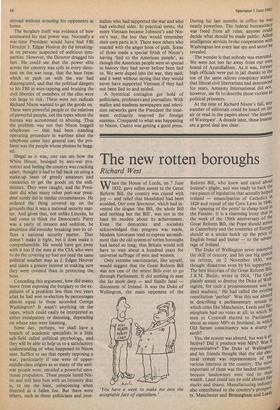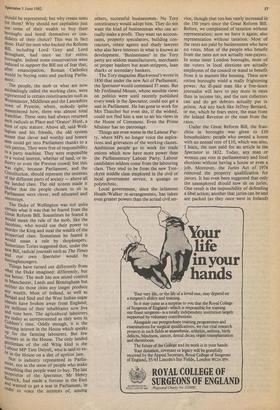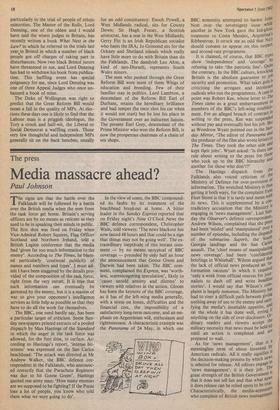The new rotten boroughs
Richard West When the House of Lords, on 7 June 1832, gave sullen assent to the Great Reform Bill, the country was crazed with joy — and relief that bloodshed had been avoided. Our own Spectator, which had in- vented the slogan 'the Bill, the whole Bill and nothing but the Bill', was not in the least bit modest about its achievement. Even the democrats and socialists acknowledged that progress was made. Modern historians tend to express astonish- ment that the old system of rotten boroughs had lasted so long; that Britain would still have to wait about a hundred years for universal suffrage of men and women.
Only extreme reactionaries, like myself, would suggest that the Great Reform Bill was not one of the wisest Bills ever to go through Parliament. It did nothing to ease the far more deep — and finally fatal discontent of Ireland. It was the Duke of Wellington, the main opponent of the `You have a week to make me into the acceptable face of capitalism.' Reform Bill, who knew and cared about Ireland's plight, and was ready to back the two pieces of legislation that actually helped Ireland — emancipation of Catholics in 1828 and repeal of the Corn Laws in 1846, the 'opening of the ports' to cheap food in the Famine. It is a charming irony that In the week of the 150th anniversary of the Great Reform Bill, the Pope should arrive in Canterbury and the countries of EuroPe should at a stroke hoick up the price of English bread and butter — to the advan- tage of Ireland. The Duke of Wellington never mastered the skill of oratory, and his one big speech on reform, on 2 November 1830, was thought disastrous even by his supporters. The best historian of the Great Reform 13111, J.R.M. Butler, wrote in 1914, 'The Gods plainly meant to destroy the Duke of Well- ington, for such a pronouncement was in- deed madness.' He had called the existing constitution 'perfect'. Was this not absurd in describing a parliamentary system !a which cities like Manchester, Leeds and Blr" mingham had no votes at all; in which 30 men in Cornwall elected to Parliament about as many MPs as Scotland; in which Old Sarum constituency was a stump of earth? Yes, the system was absurd, but was it ef- fective? Did it produce wise MPs? Was It representative? The Duke of Wellington and his friends thought that the old elec- toral system was representative of the various interests in the country. The most important of them was the landed interest, because landowners were tied to their wealth. Land could not be sold abroad like stocks and shares. Manufacturing industry also contributed to the country's prosperi- ty. Manchester and Birmingham and Leeds should be represented; but why create seats for them? Why should not capitalists just use some of their wealth to buy their boroughs and instal themselves or can- didates of their choice? This was in fact done. Half the men who backed the Reform Bill, including Lord Grey and Lord Brougham, had once sat for rotten boroughs. Indeed some conservatives were induced to support the Bill out of fear that, after emancipation, Roman Catholics would be buying seats and packing Parlia- ment.
The people, the mob or what are now misleadingly called the working class, were represented in certain constituencies such as Westminster, Middlesex and the Lancashire town of Preston, where, nobody quite remembered how, there was almost total franchise. These seats had always returned such radicals as Place and 'Orator' Hunt, a bore of epic stature. Above all, said Well- ington and his friends, the old system Meant that clever and worthy and honest men could get into Parliament thanks to a rich patron. They were free of responsibility to a party machine. They were responsible to a vested interest, whether of land, or in- dustry or even the Preston crowd; but this was right, because Parliament, and the Constitution, should represent the interests of the different parts of society — above all the landed class. The old system made it likelier that the people chosen to sit in Parliament were clever, well educated and ancorrupt.
The Duke of Wellington was not quite certain what it was that he feared from the Great Reform Bill. Sometimes he feared it Would mean the rule of the mob, like the Jacobins, who would use their power to Murder the King and steal the wealth of the Propertied class. Sometimes he feared it Would mean a rule by shopkeepers. Sometimes Tories suggested that, under the new Bill, radical journals such as The Times and our own Spectator would be "ciroughmongers. Things have turned out differently from What the Duke imagined: differently, but not better. The mob has not seized control In Manchester, Leeds and Birmingham but neither do those cities any longer produce anY wealth. Most of Ireland, as well as Bengal and Sind and the West Indian sugar islands have broken away from England; Yet millions of their inhabitants now live and vote here. The agricultural labourers are today as unrepresented as they were in Fobbett's time. Oddly enough, it is the tanning interest in the House which speaks 1:1) for the farming labourers. But few farmers sit in the House. The only landed Ilentleman of the old Whig kind is the Labour MP Tam Daiyell, who is said to ex- ist in the House on a diet of apricot jam. Nor is industry represented in Parlia- ment, not in the sense of people who make something that people want to buy. The last proprietor of the Spectator, Mr Henry "wick, had made a fortune in the East and wanted to get a seat in Parliament, in order to voice the interests of, among
others, successful businessmen. No Tory constituency would adopt him. They do not want the kind of businessman who can ac- tually make a profit. They want tax accoun- tants, property speculators, building con- tractors, estate agents and shady lawyers who also have interests in what is known as development. 'Businessmen' in the Tory party are seldom manufacturers, merchants or proper bankers but asset-strippers, loan sharks or secondary bankers.
The Tory magazine Blackwood's wrote in 1830 that under the new Act of Parliament, the Spectator would command 37 seats. But Mr Ferdinand Mount, whose sensible views on politics were until recently published every week in the Spectator, could not get a seat in Parliament. He has gone to work for Mrs Thatcher but even she, if she wished, could not find him a seat to air his views in the House of Commons. Even the Prime Minister has no patronage.
Things are even worse in the Labour Par- ty, where MPs no longer voice the aspira- tions and grievances of the working classes. Ambitious people go to work for trade unions which now have more power than the Parliamentary Labour Party. Labour candidates seldom come from the labouring class. They tend to be from the new Trot- skyist middle class employed in the civil or local government service, a quango or polytechnic.
Local government, since the infamous Heath/Walker re-arrangements, has taken even greater powers than the actual civil ser-
vice, though that too has vastly increased in the 150 years since the Great Reform Bill. Before, we complained of taxation without representation; now we have it again; also representation without taxation. Most of the rates are paid by businessmen who have no votes. Most of the people who benefit from the rates are not actually rate-payers. In some inner London boroughs, most of the voters in local elections are actually employees of the council or stand to benefit from it in matters like housing. These new rotten boroughs wield a really frightening power. An ill-paid man like a free-lance journalist will have to pay more in rates than in income tax, and the rate collectors can and do get debtors actually put in prison. Ask any hack like Jeffrey Bernard, or me, which he fears more, the man from the Inland Revenue or the man from the rates.
Under the Great Reform Bill, the fran- chise in boroughs was given to £10 householders: people who owned a house with an annual rent of £10, which was also, I learn, the sum paid for an article in the Spectator in 1832. Today, any man or woman can vote in parliamentary and local elections without having a house or even a job. Moreover, the Juries Act of 1974 removed the property qualification for jurors. It has even been suggested that only the unemployed should now sit on juries. One result is the impossibility of defending a libel action; another that juries can be and are packed (as they once were in Ireland) particularly irr the trial of people of ethnic minorities. The Master of the Rolls, Lord Denning, one of the oldest and I would have said the wisest judges in Britain, has recently written a book What Next in the Law? in which he referred to the trials last year.in 'Bristol in which a number of black people got off charges of taking part in disturbances. Now two black Bristol jurors have threatened to sue, and Lord Denning has had to withdraw his book from publica- tion. This baffling event has special poignancy for me, since Lord Denning was one of three Appeal Judges who once un- banned a book of mine.
The Duke of Wellington was right to predict that the Great Reform Bill would mean a fall in the quality of MPs. At elec- tions these days one is likely to find that the Labour man is a priggish ideologue, the Tory a crook and half-wit, the Liberal or Social Democrat a waffling crank. Those very few thoughtful and independent MPs generally sit on the back benches, usually for an odd constituency: Enoch Powell, a West Midlands radical, sits for County Down; Sir Hugh Fraser, a Scottish aristocrat, has a seat in the West Midlands; Gerry Fitt is an Irish Republican socialist who hates the IRA; Jo Grimond sits for the Orkney and Shetland islands which really have little more to do with Britain than do the Falklands. The dandyish Leo Abse, a kind of neo-Disraeli, represents South Wales miners.
The men who pushed through the Great Reform Bill were most of them Whigs of education and breeding. Few of their families stay in politics. Lord Lambton, a descendant of the Reform Bill Earl of Durham, retains the hereditary brilliance and bad temper (he once shot his car when it would not start) but he lost his place in the Government over an indiscreet liaison. The present Earl Grey, descendant of the Prime Minister who won the Reform Bill, is now the prosperous chairman of a chain of sex shops.








































 Previous page
Previous page